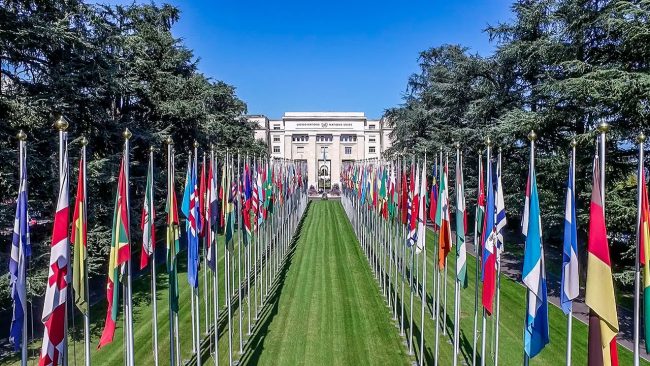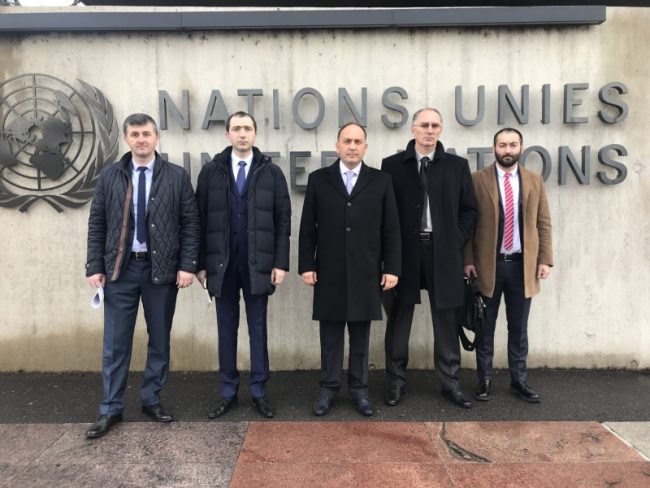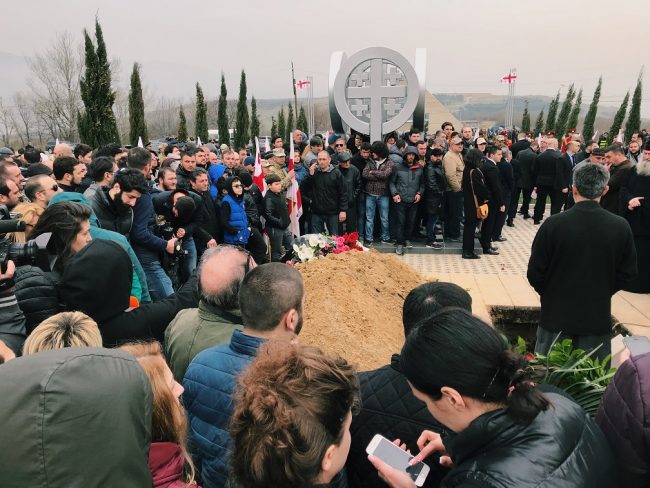

 The latest round of the Geneva discussions have ended with mutual accusations. Despite hopes from Abkhazia, South Ossetia, and Russia, the parties failed to agree on a joint oral statement on the non-use of force.
The latest round of the Geneva discussions have ended with mutual accusations. Despite hopes from Abkhazia, South Ossetia, and Russia, the parties failed to agree on a joint oral statement on the non-use of force.
Georgia criticised Russia for their ‘destructive approach’ towards the possible non-use of force agreement. Abkhazia accused the US of using ‘unacceptable wording’ in the agreement. According to the Georgian delegation, neither South Ossetia nor Russia ‘had anything to say’ about the death of Georgian citizen Archil Tatunasvhili in detention in Tskhinvali.
No joint statement on the non-use of force
‘Despite intensive engagement by all participants, it did not prove possible to finalise the draft joint statement on non-use of force’, the press communiqué from the OSCE, one of the chairs of the Geneva talks, said on 28 March. The statement was a sum-up of the 43rd round of the Geneva International Discussions, which were held on 27–28 March.
The Geneva discussions were set up to address the consequences of the August 2008 war, and are co-chaired by the EU, OSCE, and UN. The talks involve Georgian, Russian, Abkhazian, and South Ossetian negotiators, as well as the US.
‘Participants from Georgia once again explained that the acceptance of such statement should serve a specific purpose, in particular, the implementation of 12 August 2008 ceasefire agreement’, Georgia’s Foreign Ministry (MFA) said in a 29 March statement.
The EU-brokered six-point ceasefire agreement, signed by Russia and Georgia, required Russia’s armed forces to withdraw from South Ossetia, and that violence not be used by any of the parties.
According to Georgia’s MFA, Russia ‘demonstrated a destructive approach’ and drove the discussions ‘into a deadlock’ with their ‘deliberately provocative statements’.
‘What is happening right now indicates that we were on the right path, and the representatives of Moscow are not ready for progress in this direction to happen’, Davit Dondua, the Georgia’s Deputy Foreign Minister said.
‘Unacceptable wording’
Russia responded by criticising Georgian officials for ‘turning the meeting into a propaganda action’. In a 28 March statement, Russia’s Foreign Ministry said that Georgia, instead of accusing Russia of ‘occupying’ Abkhazia and South Ossetia, should ‘think seriously about restoring confidence with its neighbours’.
Russia called on Georgia to launch ‘direct dialogue’ with Abkhazia and South Ossetia, to ‘refrain from encouraging other countries to visa blockade’ Abkhazians and South Ossetians, and to repeal Georgia’s Law on Occupied Territories, which was adopted in October 2008 following Russia’s recognition of Abkhazia’s and South Ossetia’s independence.

The Abkhazian Foreign Ministry echoed Russia’s concerns in a 29 March statement, saying that ‘the oral statement was not accepted, because this time the American wording was unacceptable, returning to the old thesis about the nature of the August 2008 events’. The statement claimed the Georgian delegation tried to shift the discussion away from the non use of force agreement, by putting’ Tatunashvili’s case at the centre of the discussion.
‘They also continued to insist in their rhetoric that Abkhazia is an ‘occupied territory’ and is not a party to the conflict, and Russia should take the responsibility for the non-use of force’, their statement read.
Georgia made a unilateral pledge on the non-use of force in November 2010, which was followed by similar pledges from Abkhazia and South Ossetia, according to Civil.ge. However, Georgia, citing its territorial integrity, recognises Russia as its only legitimate counterpart in both conflicts, and has demanded the Russian authorities agree on the non-use of force. Russia has claimed that the conflicts are only between Georgia and Abkhazia and South Ossetia, and has urged Georgia to reach agreement directly with them. Only Russia and three other UN member states recognise Abkhazia and South Ossetia as independent.
The OSCE wrote that the Co-Chairs will ‘continue their consultations’ on the non-use of force agreement.
‘Nothing meaningful from Russia and Tskhinvali’ on Tatunashvili case
During the first working session on 27 March, the participants assessed the overall security situation as ‘relatively calm and stable’, according to the OSCE, but the Co-Chairs said they were ‘strongly concerned’ over the death of Georgian citizen and former soldier Archil Tatunashvili.
Tatunashvili was arrested on 22 February in Akhalgori (Leningor), and died in Tskhinvali later that night. According to South Ossetia, he died after falling down the stairs while trying to escape. They also accused him of being a Georgian informant, and ‘participating in Georgian aggression in 2004–2008’.
South Ossetian authorities handed over his body 26 days after his death. On 21 March, the Centre for Rehabilitation of Victims of Torture — Empathy, a forensics group involved in examining Tatunashvili’s body in Tbilisi, said that the preliminary results showed a number of injuries that ‘indicate a high likelihood of torture’.
Tatunashvili’s mother has said her son had a gunshot wound near the left ear, and was ‘brutally tortured’. He was buried with military honours at the Mukhatgverdi Brothers’ Cemetery on 24 March. Georgia’s President Giorgi Margvelashvili awarded him posthumously with the medal of honour.

Georgia’s Deputy Foreign Minister Davit Dondua said that ‘representatives of Russia and Tskhinvali had had nothing to say’ on Tatunashvili’s case.
The Co-Chairs ‘emphasised the need to address properly this [Tatunashvili’s] and similar cases to avoid repetition and raising tensions’, according to the OSCE’s press communique. The OSCE stressed the need to avoid impunity, and called for a ‘thorough investigation into the case and for cooperation among relevant stakeholders, including in the framework of the Incident Prevention and Response Mechanism’.
The next round of the Geneva discussions are set for June.
For ease of reading, we choose not to use qualifiers such as ‘de facto’, ‘unrecognised’, or ‘partially recognised’ when discussing institutions or political positions within Abkhazia, Nagorno-Karabakh, and South Ossetia. This does not imply a position on their status.









